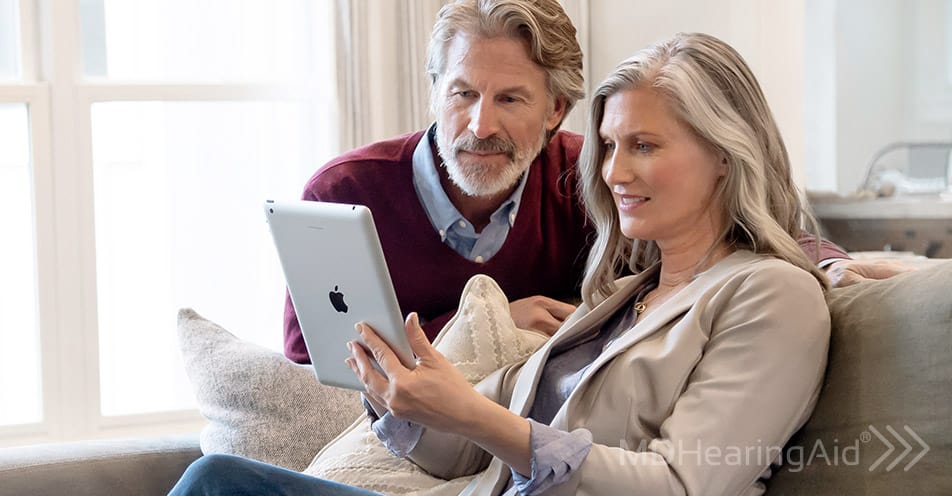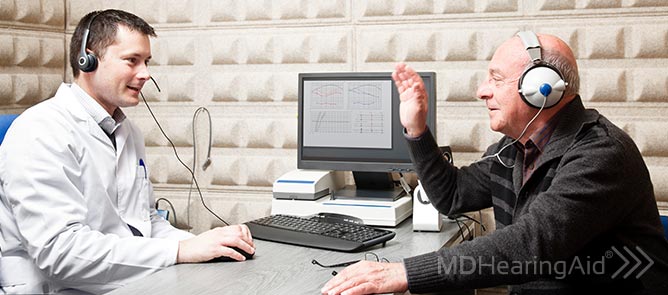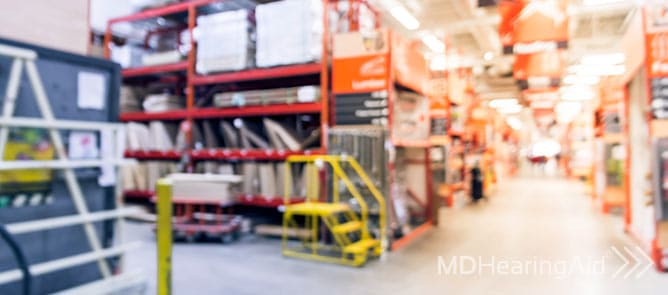Buying hearing aids can seem like a complicated mess. Many people put off getting hearing aids because it feels like a herculean task in itself, which leaves them struggling to hear the world around them. Only one in five people with hearing loss who could benefit from wearing a hearing aid are actively using one.
But it’s the 21st century, and there are now many ways you can buy hearing aids, both in person and online! From hearing clinics to online direct-to-consumer companies like MDHearing, you now have a choice in where you go for your hearing aids.
So where do you start? Check out our hearing aid buyer’s guide to learn more about your options and what path will work for you.
Using This Hearing Aid Buyer’s Guide
The first thing to remember when it comes to buying hearing aids is that everyone’s hearing (and hearing loss) is different. What works for your friend next door won’t necessarily work for you. It’s important to assess all of these providers and figure out what makes the most sense for your hearing health needs. Let’s begin!
Traditional Hearing Aid Providers
When it comes to the traditional hearing aid process, you’d have to go to a hearing aid specialist at a hearing clinic or to an audiologist’s office. Generally, audiologists have a doctorate, have passed their license exam, and have performed over a thousand hours of clinical training. Hearing aid specialist requirements differ by state, with some needing to earn a special license and others simply needing to pass an exam. Both hearing aid specialists and audiologists have some form of training to help patients with hearing loss.
At your initial appointment, the specialist or audiologist will test your hearing to figure out the extent and type of hearing loss you have. This test could include tone recognition, speech reception, and word recognition. Then, they will advise you on what hearing aid they think you need.
| Pros | Cons |
|---|---|
Personalized service | Price |
Hearing aids fit to you | Exhausting process |
Traditional Providers—Pros
You get to work one-on-one with a hearing professional. Getting your hearing checked by a professional can reveal underlying medical issues, such as excessive wax build up, which may be exacerbating your hearing issues.
Hearing aids at traditional clinics are fitted based on the results of your hearing test. While other parts of this hearing aid buyer’s guide feature better prices, if you have very severe hearing loss, audiologists and hearing clinics may still be your best option.
Traditional Providers—Cons
Traditional hearing aid sellers have to hike up prices in order to pay for overhead costs and audiologist/hearing aid specialist salaries. Hearing aids sold by hearing clinics and audiologists could cost more than $5,000 a pair! This high price tag is very rarely covered by insurance, which means you will need to pay the whole amount out of pocket.
Buying a hearing aid from the traditional model often requires multiple visits to the audiologist office. You need to get your hearing tested, you need to select your hearing aid, and you’ll likely need to make multiple adjustment visits even after getting fitted. Not all hearing clinics and audiologists have weekend or even evening hours, making it hard to schedule appointments.
Big-Box Stores
For decades, the only way to get hearing aids in the United States was from your audiologist or hearing clinic, but that’s all changing. In August 2017, bipartisan legislation was passed to establish a new category of hearing aids to be sold over-the-counter. Currently, big-box retailers like Walmart only sell hearing aids online, but within the next few years you will be able to purchase over the counter at these stores. It’s important for the hearing aid buyer’s guide to look at the benefits and issues with these kinds of stores.
| Pros | Cons |
|---|---|
Price | No service |
Convenience | No warranty |
Less selection |
Big-Box Stores—Pros
The big-box companies are able to leverage their supply chains and buying power to offer reduced prices on thousands of consumer electronics. Once they start selling hearing aids in stores, the options will likely be extremely inexpensive, although the price tag will still include some markup because it’s a brick and mortar store.
Big-box stores are usually massive chains, and there is probably one close to your your home, making them a very convenient option. Some of them also offer delivery options.
Big-Box Stores—Cons
These stores likely will just sell you the hearing aids and leave you to figure it out yourself. There’s no real guidance from staff on which hearing aid you should buy and no help with how to use and maintain it.
As retailers of other companies’ hearing aids, most of these stores can’t and won’t guarantee the quality of the hearing aid they are selling you. When you need new accessories or maintenance, you will likely be on your own.
Big box retailers don’t always have the newest hearing aid technology on the market, and may not have as many options to choose from.
Costco
Unlike other big-box stores, Costco’s hearing aid process is closer to the traditional model.
| Pros | Cons |
|---|---|
Less overhead | Must be a Costco member |
In-store hearing test | Dragged out process |
Inconvenient customer service |
Costco—Pros
Costco members are able to go into a Costco, get a hearing test done by a hearing professional, order Costco hearing aids based off of their store selection, and come back for adjustments similar to a hearing clinic.
Since the hearing center is within the Costco’s warehouse store, you are not paying for a fancy retail space when you buy hearing aids. There are still some overhead costs of the store but Costco can offer hearing aids for less than the traditional model.
Costco—Cons
Costco membership isn’t free, and while you can get your hearing tested at a Costco without a membership, you’ll need to be a Costco member to buy a hearing aid.
Like the traditional model, getting hearing aids from Costco can be a dragged out process. It’s reportedly common for Costco customers to have to schedule hearing test and adjustment appointments months in advance.
If you decide you don’t like their service, you might still be stuck with them. Costco hearing aids are often locked to their programs, meaning you can only have them adjusted at a Costco location.
Amazon
Along with the new regulation for over-the-counter hearing aids mentioned earlier in this Hearing Aid Buyer’s Guide, the internet has new avenues for consumers to get the hearing devices they need at lower prices. But not all online hearing devices are created equal.
Amazon, for instance, mostly only sells personal sound amplification products (PSAP). These sound amplifiers are not medical devices and are not meant for people with hearing loss. If you have hearing loss or suspect you do, this hearing aid buyer’s guide suggests you be cautious about any claims made by PSAP manufacturers, as these devices are not registered with the FDA. They are consumer electronics meant for activities such as bird watching.
| Pros | Cons |
|---|---|
Cheap | Unknown quality |
Quick delivery | Lack of help |
Amazon Hearing Aids
In 2019 Amazon started selling hearing aids, including Eargo and Hearing Assist. Read our full guide to Amazon Hearing Aids here.
Amazon PSAPs—Pros
Amazon is flooded with PSAPs from various third-party vendors. In fact, amplifiers can be purchased on Amazon for under $20. Largely, these extremely inexpensive PSAPs are made in China and don’t have amplification focused on human speech or any background noise reduction, but some amplification may be better than none. A cheap device might be a good starting point for you, but know that you may struggle with unnecessary noises being amplified.
If you’re looking to receive a solution ASAP, Amazon is known for their fast delivery process, especially if you’re a Amazon Prime member.
Amazon PSAPs—Cons
PSAPs are not registered with the FDA and are not intended to treat hearing loss. Amazon is a great place to read reviews from real customers, and if you do your homework you can likely find higher quality devices within all the junk being sold for a quick buck. Remember to be vigilant when reading the reviews, checking how many reviews the device has, and whether the reviews sound like they are from real customers or a company spokesman.
While you can be relatively sure Amazon will refund your money without a hassle if you get a dud PSAP or the device does not work for your needs, Amazon customer support agents deal with thousands and thousands of products every day. They might not be able to completely assist you or give you advice about getting the most out of your hearing device.
Buying Directly Online
The newest addition to any hearing aid buyer’s guide is direct-to-consumer online hearing aid companies. They sell and ship their hearing aids directly to their customers. MDHearing is proud to lead the way with our balance of effective hearing aids and reasonable prices.
The MDHearing Difference
MDHearing was founded by an ear, nose, and throat doctor who knew there had to be easier ways for patients on a budget to buy effective hearing aids. Hearing aid quality and affordability can go hand in hand. MDHearing is committed to providing hearing aids that just as good as the bigger manufacturers, but within your budget.
| Pros | Cons |
|---|---|
Affordable | No in-person evaluation |
Easy ordering | |
45-day satisfaction guarantee and 90-day warranty |
Buying Direct—Pros
MDHearing knows there’s a difference between cheap hearing aids and affordable hearing aids. We’ve removed the expensive storefronts and appointments. By selling directly to our customers, we’ve removed the middleman and passed the savings on to you. You can get our state-of-the-art, FDA-registered hearing aids for as little as $34 a month. While most insurance doesn’t cover hearing aids, youcan use your FSA/HSA account with your MDHearing purchase.
Whether you order online or by phone, MDHearing makes it easy to order and provides free shipping on all of our hearing aids. We offer several hearing aid options for our customers, including the highly customizable LifeEar Core.
We’re so confident in our products that we offer a 45 day risk-free trial and money-back guarantee. We also cover against defects in materials and workmanship for 90 days from the time you receive your order.
Buying Direct—Cons
Because we eliminate the expensive storefronts, we do not have a physical location for you to visit. Instead, our audiologist and customer service team can give you feedback about your personal hearing health online or over the phone. If you have a recent hearing test on hand, send us the results and our audiologist will point you to the hearing aid that makes the most sense for your situation. We also offer free one-on-one phone support from our knowledgeable customer care team.
Next in our Hearing Aid Buyer’s Guide: the types of hearing aids you can choose from!
READ CHAPTER TWO





